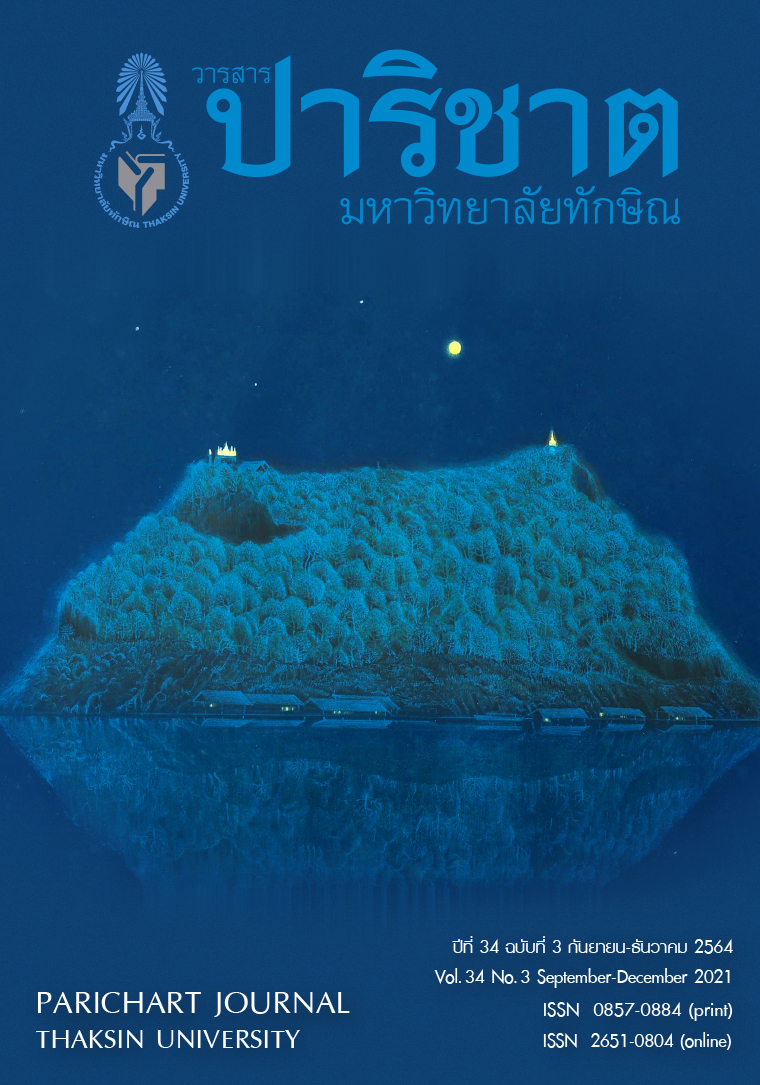The Ethical Status of Animals in Perspective of Moderate Postmodern Paradigm: An Analytic, Appreciative and Applicative Study
Main Article Content
Abstract
The objective of this research article was to study whether animals in perspective of moderate postmodern paradigm have ethical status and how by philosophical approach, dialectic and discursive qualitative methodologies. The research found out that reasons of antagonists that were previous responses in academic society presenting that animals have no ethical status, animals with ethical statustreated as inferior beings, and animals have an ethical equality status by grouping them with discrimination based upon species membership of ‘Speciesism’ to examine if it was appropriate to be the answers of research questions, which were 1) a group with the perspective that animals have no ethical status of their own, or if they have an ethical status inferior to that of humans standpoint and 2) a group of people with animals have equal ethical status to humans standpoint. In criticism of the antagonist’ s reason, both groups were unable to answer choices for this research question
because philosophical assumptions were not consistent with philosophical concepts of
moderate postmodern paradigm. According to the study, the researchers proposed the new reason that those were primarily related to interspecies equality. This study, therefore, suggested that interspecies equity was a principle of thought. Eventually, the new proposition from the researchers is animals have an ethical equity status, the same as all living creatures. The results can be applied for an alternative ethical principle in harmonythat all humankind can and will be given in the primary concept of humane treatment to animals.
Article Details

This work is licensed under a Creative Commons Attribution-NonCommercial-NoDerivatives 4.0 International License.
References
Darwin, C. (2009). Natural selection; or the survival of the fittest. In C. W. Eliot (Ed.), The origin of species: The five food shelf of classics Vol. XI (in 51 volumes). (pp. 93-144). New York: Cosimo Classics.
Rowlands, M., (2002). Animals like us. New York: Verso.
Singer, P. (1990). Animal liberation (2nd Ed.). New York: Random House.
Ryder, R. D., (2000). Animal revolution: Changing attitudes towards speciesism. New York: Bloomsbury Academic.
Macdonald, J. M. (1963). The threat to kill. The American Journal of Psychiatry, 120(2), 125–130.
Lockwood, R. (1998). Cruelty toward animal and human violence. In Encyclopedia of animal rights and animal welfare (pp. 122-123). Westport, CT: Greenwood Press.
Merz-Perez, L., & Heide, K. M. (2003). Animal cruelty: Pathway to violence against people. Lanham, MT: Altamira Press.
Barrow, L. M., & Rufo, R. A. (2013). Police and profiling in the United States: Applying theory to criminal investigations. Boca Raton, FL: CRC Press.
Ascione, F. R. (1998). Children who are cruel to animal: A review of research and implications for developmental psychology. In R. Lockwood (Ed.), Cruelty to animals and interpersonal violence: Readings in research and application (pp. 83-104). West Lafayette, IN: Purdue University Press.
Linzey, A. (2013). The global guide to animal protection. Champaign, IL: University of Illinois Press.
People for the Ethical Treatment of Animals (PETA). (2014). Cruelty to animals and family violence. Retrieved on March 18, 2014, from http://www.peta.org/issues/companion-animal-issues/companion-animals-factsheets/animal-abuse-humanabuse-partners-crime/.
Strozier, A. L., & Carpenter J. E. (2008). Introduction to alternative and complementary therapies. Binghamton, NY: The Haworth Press.
Pirro, J., & Whitney, C. (2003). To punish and protect: One DA’s fight against a system that coddles criminals. New York: St. Martin’s Press.
Satha-Anand, C. (1996). Peace theory and cultural elements. Bangkok: Komol Kheemthong Foundation. (In Thai)
Hüppauf, B. (1997). Introduction modernity and violence: Observations concerning a contradictory relationship. In B. Hüppauf (Ed.), War, violence, and the modern condition (pp. 21-22). Berlin: de Gruyter.
Berkman J. (2014) From theological speciesism to a theological ethology: Where catholic moral theology needs to go. Journal of moral theology, 3(2), 11-34.
Bunchua, K. (2017). Suan Sunandha philosophy book series, Vol. 2: Introduction of philosophy and ethics. Bangkok: Charoenpon Graphic. (In Thai)
________. (2002). Postmodern philosophy: New concepts for modern education. Bangkok: D.K. Editions. (In Thai)
Bunchua, K. (2014). 84,000 Dhamma Khandhas are for scholars, not for educators. SSRU Graduate Studies Journal, 7(1), 1-15.
________. (2017). Suan Sunandha philosophy book series, Vol. 1: Fundamental philosophy. Bangkok: Charoenpon Graphic. (In Thai)
________. (2017). Suan Sunandha philosophy book series, Vol. 7: Hermeneutics in philosophy, religion, and ethics. Bangkok: Charoenpon Graphic. (In Thai)


